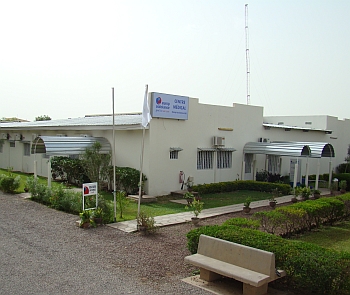City clinics in support to remote site operations
 In cities closest to major industrial sites where medical services are not sufficiently developed, clinics operated either independently or as implants in existing facilities have been established to ensure that emergency stabilization is accessible and that patients requiring critical care prior to evacuation can receive medical treatment in conformity with international standards.
In cities closest to major industrial sites where medical services are not sufficiently developed, clinics operated either independently or as implants in existing facilities have been established to ensure that emergency stabilization is accessible and that patients requiring critical care prior to evacuation can receive medical treatment in conformity with international standards.
The latter include the availability of properly trained local and international medical staff, access to all necessary equipment, supplies and medications, well-rehearsed protocols and procedures and a continuous quality improvement program in place.
Differentiating models to deliver medical services
Two models are used to provide medical services within a city clinic.
The first model is the self-standing model where the facility is fully operated by the assistance company, has autonomous laboratory, imaging, pharmacy and in-patient capabilities, and focuses on high quality emergency, routine and occupational medical services. It relies on agreements with other accredited providers in the city for specialist medical services such as surgery or obstetrics.
The second model consists in having an implant within an existing institution, always a hospital, and sharing services. This model is appropriate when volumes do not justify the investment required by the first model.
Accompanying organizations beyond emergency medical care
The initial concept of city clinics is to bridge the gap between on-site stabilization and evacuation to the nearest place of medical excellence for definitive treatment. While these facilities exist primarily to cover emergency needs, they are also used to provide other medical services.
Employee populations working on an operator’s remote industrial site are the first to benefit from such facilities in case of emergency. However, as the volume of activity generated by emergencies alone does not justify the investments required on its own, city clinics also offer other outpatient, day-care, and in-patient medical services benefiting the operator’s employees as well as affiliated populations such as employee dependents and subcontractors’ employees living in the city.
Available as part of a comprehensive and customized healthcare program, these complementary services, comprise general practice, preventive medicine, standard laboratory tests, medical imaging services and occupational health services including pre-employment, routine, post-incident and specific medical examinations such as drug and alcohol testing.
Improving productivity through added-value health services
City clinics’ first role is to bring international standards medical care to the expatriate and national employee populations and their dependents. In locations where medical infrastructures are lacking and where medical care quality is poor, city clinics ensure patients receive quality care locally.
By avoiding a medical evacuation and ensuring quick recovery and subsequent prompt return to work, organizations can reduce costs, absenteeism rates and increase productivity levels.
For organizations operating in high risk or difficult environments, providing access to international standards medical care can provide a significant incentive for their local employees and international assignees.
Facilities incorporating clinic management tools into the management of healthcare programs, especially in unregulated and complex environments, can considerably improve the quality of medical services rendered to the patients, the optimization of stock controls, the confidentiality of medical and private data collection, the increase of the medical facilities profitability, as well as patient satisfaction. Integrated reporting capabilities also allow organizations to have an immediate monitoring of their employees’ medical expenses as well as comparative metrics based on international standards.
Client-centric glocal approach
Providing international standards of medical care combined with flexibility in developing a program specific to the organization as well as having a deep understanding of the local environment (local provider network, local regulations, local culture) are key components to the successful establishment and running of a city clinic.